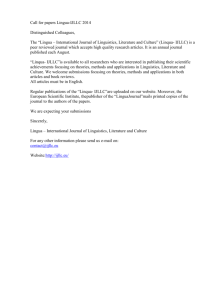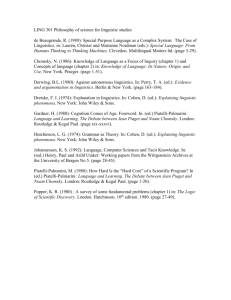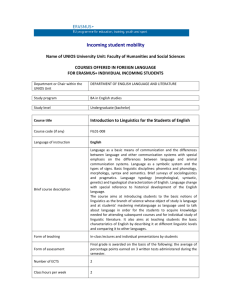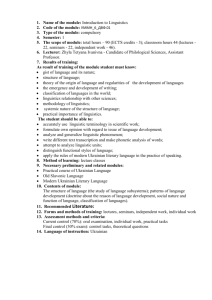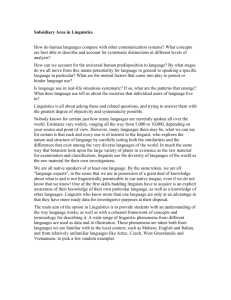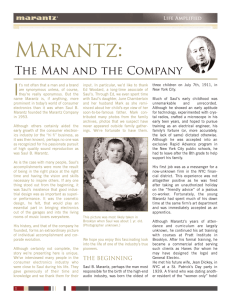Syllabus - New York University
advertisement
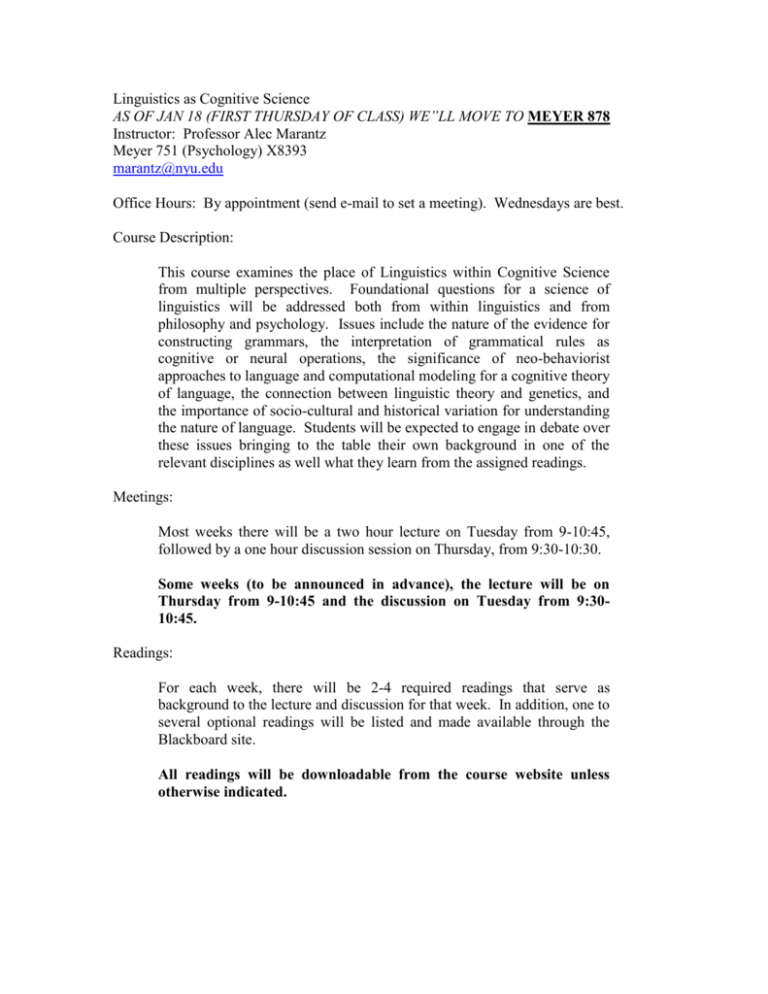
Linguistics as Cognitive Science AS OF JAN 18 (FIRST THURSDAY OF CLASS) WE”LL MOVE TO MEYER 878 Instructor: Professor Alec Marantz Meyer 751 (Psychology) X8393 marantz@nyu.edu Office Hours: By appointment (send e-mail to set a meeting). Wednesdays are best. Course Description: This course examines the place of Linguistics within Cognitive Science from multiple perspectives. Foundational questions for a science of linguistics will be addressed both from within linguistics and from philosophy and psychology. Issues include the nature of the evidence for constructing grammars, the interpretation of grammatical rules as cognitive or neural operations, the significance of neo-behaviorist approaches to language and computational modeling for a cognitive theory of language, the connection between linguistic theory and genetics, and the importance of socio-cultural and historical variation for understanding the nature of language. Students will be expected to engage in debate over these issues bringing to the table their own background in one of the relevant disciplines as well what they learn from the assigned readings. Meetings: Most weeks there will be a two hour lecture on Tuesday from 9-10:45, followed by a one hour discussion session on Thursday, from 9:30-10:30. Some weeks (to be announced in advance), the lecture will be on Thursday from 9-10:45 and the discussion on Tuesday from 9:3010:45. Readings: For each week, there will be 2-4 required readings that serve as background to the lecture and discussion for that week. In addition, one to several optional readings will be listed and made available through the Blackboard site. All readings will be downloadable from the course website unless otherwise indicated. Requirements: All registered students should complete the required readings and participate actively in discussion sessions. Attendance and participation are your most important obligations. For the discussion, each week a graduate student will be assigned to provide a very brief (no more than 5 minutes) summary of the Tuesday lecture and an undergraduate will be assigned to ask an informed question about the lecture and/or the assigned readings. Each student will perform one of these tasks once in the semester (weeks to be assigned by the third week of the semester). Two discussion papers (10-15pp) are also required, one due March 9 and one due April 30. These papers should argue for or against a position on one of the major debates over the role of linguistics in cognitive science that serve as the touch point for class lectures. Graduate students will be assigned to sets of undergraduates and will meet once with their set to discuss the undergraduates’ paper topics (so, twice in the semester, once for each paper), providing some insight from their particular field of specialization (philosophy, linguistics, or psychology). Schedule “Key Reading” is not exhaustive of readings Course Class Topic Section Introduction Opening session Lecturer Key reading Marantz Foundations Nature of the of data Linguistics Marantz Marantz, A. 2005. Linguistics as Cognitive Science. The Linguistic Review 22, 429–445 Chomsky, N. 1976. On the Nature of Language. Essays on Form and Interpretation, 63-80. Machery, E, R Mallon, S Nichols, and SP Stich 2004. Semantics, cross-cultural style. Cognition 92 (3): B1– B12. 2 Lecture Date 1/16 1/23 Nature of the data 2 Linguistics in the Philosophy of Language Linguistics in Psychology Stephen Neale 1/30 Nature of linguistic enterprise Sorace, A. & F. Keller. 2005. Gradience in Linguistic Data. Lingua, 115: 11, 1497–1524. Noam Chomsky, N. 2000. Chomsky Minimalist inquiries: The (may need framework. In Step by Step, to be R Martin, D Michaels, and J rescheduled Uriagereka (eds.). later in Cambridge, MIT Press, 89– semester) 155. Rules & Rule Following Ned Block 2/15 (Note Th lecture) Meaning and linguistic structure Jerry Fodor Names Stephen Schiffer Grammar as processing theory vs. grammar plus strategies Brian McElree Neobehaviorism Marantz Laurence, S. 2003. Is Linguistics a Branch of Psychology?, in A. Barber, ed., Epistemology of Language, Oxford. Fodor, J. A. and E. LePore 1993. Why Meaning (Probably) Isn't Conceptual Role. Philosophical Issues 3: 15-35.. Kripke, SA. 1980. Naming and Necessity. Cambridge, Harvard University Press. Townsend, DJ & TG Bever. 2001. Sentence Comprehension: The Integration of Habits and Rules. Cambridge, MIT Press Elman, J. et al. Rethinking Innateness: A Connectionist Perspective on Development. 1997. Cambridge, MIT Press. 3 2/6 2/20 2/27 3/6 3/20 Linguistics Evolution and Biology Linguistics on Linguistics Tecumseh Fitch Genes Gary Marcus Multiple Grammars Marantz Simpler Syntax Marantz Special Languages Marantz Hauser, M. N. Chomsky & T. Fitch. 2002. The Faculty of Language: What Is It, Who Has It, and How Did It Evolve? Science, 298:5598, 1569 – 1579. Marcus, GF & SE Fisher 2003. FOXP2 in focus: what can genes tell us about speech and language? TiCS. 7:6, 257-262. Yang, C. 2004. Universal Grammar statistics or both. TiCS. 8:10, 451-455 Jackendoff, R. & Culicover, P. 2005, Simpler Syntax, Oxford University Prress. Goldberg, A. 2003 Constructions: a new theoretical approach to language, TiCS 7:5, 219-224 McWhorter, J. 2001. The world?s simplest grammars are creole grammars, Linguistic typology, 5:2-3, 125-166. 4 3/29 (Note Th lecture) 4/3 4/10 4/17 4/24


